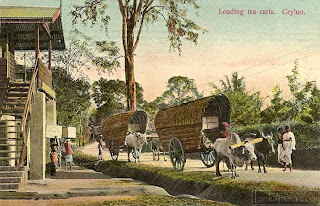the history of ceylon
while there have been Studies of british social and economic policy in respect of the industry,
the role of the indian workers in the fashioning of the modern economy of ceylon
emergence of the working class, has been neglected. when hugh tinker's A NEW SYSTEM OF SLAVERY.
THE EXPORT OF INDIAN LABOUR OVERSEAS 1830 to 1920 was published by the oxford university press in 1974 for the institute of race relations, the publishers were able to claim that it was
" the frist comprehensive historical survey of a hitherto neglected and only partially known
migration- the export of indian to supply the lobour needed in producing plantation crops such
as sugar, coffee, tea, and rubber in mauritius , south and east africa, the caribbean, guyana , ceylon
malaya and fiji
K.M.De silva, the srilankan historian, drew attention in 1961 to the fast that "while
the movement of indian immigrant labour to the west indies and mauritius
several books and monographs, particularly by students seeking to show the development of the concept of
imperial trusteeship, the movement to ceylon
Two srilankans, kumari jayawardene and dharmapriya wesamperuma, have published major studies
of working class history but they do not focus on the coffee workers. jayawardena's THE RISE
OF THE LABOUR MOVEMENT IN CEYLON deals with the half centurty between the late 1880's when planterswere switching from coffee to tea, or cinchona, to the 1930's which constituted the last full decade before independence. wesamperuma concentrates on immigrant labour but only between 1880 and 1910 which again is the time when tea replaced coffee.
there has been on lack of emotive statements by indians on the subject of indian labourers
overseas. four years after indian attained independence, N.V.Rajkumar, foregin secretary of the indian
national congress wrote that the sufferings and hardships which indian workers overseas had experienced
"soiled pages of human history". in 1959,H.N.K.Kunzru,president of the indian cuncil of world affiars, wrote in a foreword tousha mahjani's BOOK on THE IN ROLE OF INDIAN MINORITIES BURMA AND MALAYA that "no indian can read the story of indian labours emigrating to different parts of the world without a deep sense of humiliation".1979,I.J.Bahadur singh, who edited THE OTHER INDIA: THE OVERSEAS INDIANS AND THEIR RELATONSHIP WITH INDIA,sWROTE THAT "The story of the fate and fortunes of indians who went abroad, particularly in the pre-independencedays, is a fascinating and heroic one which has not yet been unfolded in its totality




No comments:
Post a Comment